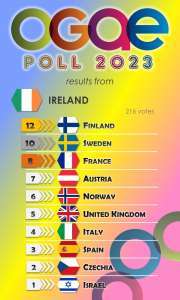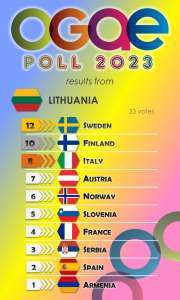Yesterday, 16th of April, London held the last pre-party for this year’s Eurovision season.
London Eurovision Party 2023 was held in Here at Outernet and presented by Nicki French(UK 2000) and Paddy O’ Connell(former Eurovision commentator for the BBC).
22 Eurovision participants sang in London and you can watch their live performances below:
There is a big difference between the studio version and their live performance. It’s a rock performance and it shows that band songs are meant for live performances. It is indeed difficult to make any predictions, but I wouldn’t be surprised in case it does well with the televoting, even if Australia is usually a jury favorite.
https://www.youtube.com/watch?v=sCNeHC4NvAI
A much loved entry by Eurovision fans and it is worth it. The vocals are good, the chemistry between the duo is splendid, the weird dancing is present and the crowd is loving it. Austria has managed to beat the odds so far, contrary to those who thought that Who the Hell is Edgar was going to be a fan-flop, similarly to last year’s Halo. Now, we will only have to see how it works in Liverpool stage!
https://www.youtube.com/watch?v=qlf8Sb5RaUQ
A beautiful song for sure and regardless the final result, I’m really glad that Azerbaijan finally sent a song that was written by Azerbaijani people. Although, that doesn’t seem to be enough and their performances do not have a large appeal. Probably we will not see them perform in the Grand Final.
https://www.youtube.com/watch?v=FLvPB2-2LAc
The most controversial entry of Eurovision 2023. Controversial is also the whole career of Let 3. Although, everyone thought that they wouldn’t make it to the Final, their live performances prove the opposite. The crowd is having fun and singing with them and their eccentricity will sure be noticed. It looks like Croatia made the right choice!
https://www.youtube.com/watch?v=CHnz8Y4SmHI
A fan favorite to win at first, but at the moment it does not give winning vibes. It was a better performance than usual but it will be a long way for Czechia in order to achieve their result. Their vocals were better but staging still looks messy and chaotic and it does not put across the message of the song. There is still time!
https://www.youtube.com/watch?v=yZdTtoA6IcI
A much better performance than usual but it remains a song that has small potential when live performed. Reiley being famous on TikTok might be helpful for his entry, so I can’t exclude any possibility.
https://www.youtube.com/watch?v=-Ng571hW6Ro
A beautiful song and impressive vocals. That’s it! It’s another cliché Eurovision ballad, not good enough for Alika’s vocal abilities.
https://www.youtube.com/watch?v=QWma2X8tnxA
We can all understand the hype. Exactly like any of his performances, he gives once more the 100% of his personality and energy. The crowd goes crazy and here we have if not the winner, a top 3 contender.
https://www.youtube.com/watch?v=VeBDb3QoKss
Strong vocals and stage presence as Diljá is an energetic performer. Although, the song doesn’t seem enough for Diljá either.
https://www.youtube.com/watch?v=R5GrD6IRMfc
A good band performance, full of energy. On the other hand, the song does not stand out for their qualification. It’s not anything new, it’s something done before but it’s not done well.
https://www.youtube.com/watch?v=7c03adZUY3I
-
Lithuania – Monika Linkytė
Monika brought the London Community Gospel Choir for her performance in London Eurovision Party. A vocal powerhouse. The song slowly receives more support and it’s all because of Monika herself. Stay is going to be loved by the juries and we can’t exclude the possibility of the public voting for her. She has a personality and you can’t skip over it.
https://www.youtube.com/watch?v=FplK-xqYZ90
Good vocals and great energy on stage. Looks like they are having fun. Frontman’s moves resemble exactly what the song is all about, feeling socially anxious in parties. I really like this entry, but unfortunately it doesn’t stand out and it’s not enough for Malta’s ticket to the Final.
https://www.youtube.com/watch?v=OZF3ucUwzok
A really energetic performance of Pasha. The crowd is enjoying it and is probably sending him straight to the Final.
https://www.youtube.com/watch?v=dVM4HO6991Q
Vocally speaking she gets better and better each time. Personally, I don’t mind any voice cracks of Alessandra. She has a really strong entry, her presence is imposing and her view of pre-parties like actual parties, is actually obvious when performing.
https://www.youtube.com/watch?v=nPRsTpDEV3A
Although I’m not a big fan of this year’s Portuguese entry and looks weird to me, Mimicat is vocally flawless and I’m waiting for a better performance on Liverpool to disprove me.
https://www.youtube.com/watch?v=COErIMq3AFo
You will either like it or not. I don’t like it. Vocally he’s good but none of his performances, although far better than the one in Romania’s NF, seems convincing, just messy.
https://www.youtube.com/watch?v=ZwR26PjTJI8
-
San Marino – Piqued Jacks
In any means, not a bad song. The lead singer is vocally on point. The whole package, although, is not enough.
https://www.youtube.com/watch?v=nep9c326_x4
I still don’t get the song. It’s not my favorite entry but it is quirky, eccentric and special. He still looks awkward to me when referring to his stage presence. I’m waiting for his performance in Liverpool!
https://www.youtube.com/watch?v=yXy8vNlVIDA
I love that song! Although, the studio version was not that promising at first, the charisma of every single one of the band’s members is to die for. They are stylish, humorous and committed to what they do. I hope to see that energy in Liverpool and Slovenia finally getting awarded with a good result.
https://www.youtube.com/watch?v=GwZIzxI7who
The real queen of this year’s Eurovision. She teaches every Eurovision winner about when and how to return back. Vocally flawless and she seems to be connected with the crowd. Although, the led platform is missing, her strong personality is here and elevates the song. Personally, I want to see her crowned as a winner again!
https://www.youtube.com/watch?v=tCYrO5vspeM
Whether you like her entry or not, one thing is for sure. No one can deny Blanca’s flawless vocals and how expressive she is. Although, I can’t fully understand the song, because it has many references to Spanish culture, every time I watch her performances, her emotions really touch me. RTVE is here to win, although I don’t think it will be come true. A great entry, one of my favorites, and it is a good example on what should follow the next year after a great Eurovision result.
https://www.youtube.com/watch?v=ep2fuj9-FBc
-
United Kingdom – Mae Muller
MAE I LOVE U!!!I can’t be completely honest with her. Vocally wise, her best performance. What it is indeed challenging is not exactly her vocals but how it will be staged. It needs some dancing, but mostly sass and attitude. These are Mae’s weapons, indeed. She seems to enjoy it and no matter the comments, crowd loves her. It’s the most mainstream pop song of this year’s Eurovision, there’s no way it will not be placed high!
https://www.youtube.com/watch?v=jJYqmM3g5qk
Which were your favorite performances? Write in the comments!
Stay tuned on EurovisionFun for more news about Eurovision 2023!







